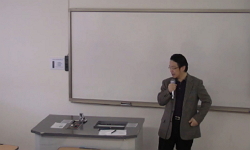전후(戰後) 아시아 인식은 제국적 지형 위에 세워진 냉전체제와의 관련 속에서 전개된다. 한국전쟁은 아시아의 냉전체제를 심화시킨 매개로 작용하였다. 냉전의 아시아적 특성을 논할 때 한...
http://chineseinput.net/에서 pinyin(병음)방식으로 중국어를 변환할 수 있습니다.
변환된 중국어를 복사하여 사용하시면 됩니다.
- 中文 을 입력하시려면 zhongwen을 입력하시고 space를누르시면됩니다.
- 北京 을 입력하시려면 beijing을 입력하시고 space를 누르시면 됩니다.
1950년대 한국문학비평과 문화담론 - ‘육체’의 문화적 표상을 중심으로-
한글로보기https://www.riss.kr/link?id=G3734401
- 저자
-
발행기관
-
-
발행연도
2009년
-
작성언어
Korean
-
주제어
전후(戰後) 아시아 ; body of discourse ; modernism ; realism ; A physical representation ; war ; post war korea literature ; Sociology of literature. existentialism ; poat war korean literature critisim ; colonial subject ; cultural symbol ; 냉전체제 ; 저항적 문화담론 ; 육체담론 ; 문화적 신체 ; 문화내셔널리즘 ; 전후 한국문학 ; 전후 문학비평 ; 1950년대 한국문학.
-
자료형태
한국연구재단(NRF)
-
0
상세조회 -
0
다운로드
부가정보
국문 초록 (Abstract)
전후(戰後) 아시아 인식은 제국적 지형 위에 세워진 냉전체제와의 관련 속에서 전개된다. 한국전쟁은 아시아의 냉전체제를 심화시킨 매개로 작용하였다. 냉전의 아시아적 특성을 논할 때 한국전쟁이 핵심적인 논점에 있는 것도 이와 무관하지 않다. 한국전쟁을 전후하여, 중국에서는 남한이 미국과 손잡고 항일운동가를 탄압하고 반공국가를 건설한 주범으로 ‘금기’의 대상이었으며, 일본의 경우에서는 현지 공장을 기반으로 무기, 탄약제조, 수리공장이 되어 병력과 물자를 출하하는 근거지가 되었다. 한국전쟁은 유럽에서 시작된 냉전을 아시아에까지 확대시켜 세계적인 냉전 상황을 초래했다. 미국은 한국전쟁을 계기로 일본의 대일강화 조기체결에 나섰다. 이 시기 한국전쟁의 특수로 일본 경제가 황폐에서 벗어나 부흥했고, 국민이 기아에서 탈출했다는 식의 시각에는 전쟁의 희생양일 수밖에 없었던 한국에 대한 정치사회적인 인식이 내재되어 있는 것이다. 한국전쟁을 둘러싸고 동아시아 각국의 이권문제가 개입했다는 것은 냉전체제를 장기적으로 유지할 수밖에 없었던 복잡한 정치, 사회적인 양상을 짐작하게 해준다.
사실 냉전의 문화화를 사상적 대치의 아시아적 재구성이라고 명명하는 이유는 한국전쟁 이후 가속화된 문화적 냉전과 관련이 있는 것이다. 다시 말해서 한국전쟁은 아시아에 의한 아시아의 분열을 야기 시켰으며, 자유주의 이념과 미국 환상을 유포하며 ‘반공 아시아’의 경계를 이데올로기적 차원에서부터 일상적 차원으로까지 확장시킨 동인이기도 했다. 냉전의 문화화는 ‘저 문명세계가 유엔의 헌장 아래서 맺은 약속’처럼 문명과 야만의 대치와 야만의 타자화 및 패권적 지배의 논리를 양산했던 것이다.
그러므로 한국전쟁 이후 문화담론에서 집중적으로 조명되어야 하는 것은 반공 이데올로기의 내면화 과정, 혹은 냉전의 문화화가 아니라 오히려 통일성이나 동일성으로 결코 환원될 수 없는 다양한 욕구에 대한 관심이다. 냉전체제 하에서 자유민주주의가 정치적, 군사적 반공과 동일시되는 경우에는 국가(민족)경계를 새롭게 구획하도록 강제하는 원동력이지만, 문화적 측면에서의 자유민주주의가 보여주는 개인주의적 분방함이란 민족/국민적 정체성을 구성하기보다는 오히려 교란시키는 요인으로 작용하는 것이다. 저항적 문화담론에서 중요한 것은 그 교란의 자장이 어떻게 다의적인 공간으로 심화 확대되어 가는가에 있다.
전후 한국문학을 중심으로 이루어진 ‘육체담론’의 정치적 함의는 일본문학과의 관계 속에서 냉전담론 논리와는 다른, ‘비균질적인’ 방향으로 전개되었다. 전후 한국과 일본 문학(화)담론에서의 육체문제는 ‘육체(body)’ 그 자체가 아니라 문화적 담론으로서의 육체(body of discourse)다. 비유적으로 말하자면 전후 한국문화담론에서 소위 정치적인 신체는 절대적이며 주권의 권력 안에서 통일되어 있었다 할지라도, 문화적 신체는 국가의 질서를 결정하고 보장하는 것들에 대한 반동적인 움직임을 갖고 있음을 알 수 있다. 전후 국가통제와 정치적 통제로부터 자유롭고자 하는 욕망은 육체담론처럼 비결정적인 영역에서 출현하는 것인지도 모른다. 한국과 일본의 전쟁체험과 동아시아의 평화를 바라보는 시각에는 다분히 이질적인 요소들이 내재되어 있다. 그렇기 때문에 문화내셔널리즘이 표방하는 보편주의. 냉전문화의 내면화에
다국어 초록 (Multilingual Abstract)
After the 1950s, Korea literary criticism and cultural discourse Choi, Sung-sil Before and after the Cold War in Asia is the center of the recognition. You know the Cold War of attributes are at the heart of Korea. When Korea War in South Korea, Ja...
After the 1950s, Korea literary criticism and cultural discourse
Choi, Sung-sil
Before and after the Cold War in Asia is the center of the recognition. You know the Cold War of attributes are at the heart of Korea. When Korea War in South Korea, Japan was providing military supplies, the U.S. troops were assisting. However, the situation around the American political and economic powers were.
However, under a liberal democratic political system, the Cold War, anticommunist military and is equated to reinforce nationalism. But the cultural dimension of democracy, advocating the freedom of the individual freedoms, rights and demands for increases.
Korea after the war to be illuminated by cultural discourse emanating from the internalization process of anti-communism ideology, or culture of the Cold War, the castle never angry, but rather unity and the same interested in a variety of needs.
South Korea South Korea after the war mainly consists of literature, physical discourse of the political implications of the Japanese literature in relation to logical discourse is different from the Cold War, ‘direction has been deployed. After South Korea and the Japanese Literature on the physical problems discourses ‘body (body)’ has its own cultural discourse, as well as the physical (body of discourse) it. Metaphorically speaking, and the absolute sovereignty of political power within the body are unified. However, in order to determine the cultural and national bodies to ensure that things will move a reactionary.
State control over postwar desire to be free from political control and physical discourse, whether as a occurrence may be in the area. Japan and South Korea's experience of war and peace in East Asia, looking very much disparate visual elements that are inherent. Universalism, however, are advocating a cultural nationalism. Cold War hostility and attacks based on internalization of culture, self-evident that to deny the identity of the rebel movement and the Cold War, rather than the value of freedom and peace issues and will function as a common potential.
Key words: The Cold War in Asia, The Korea War, Culture of the cold War, postwar desire, anti-communism ideology, Japanese Literature, The body, cultural nationalism








